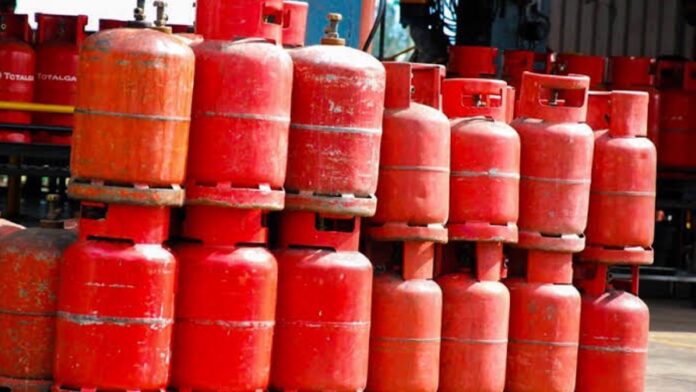The price of Liquefied Petroleum Gas (LPG), commonly known as cooking gas, has continued to surge across Nigeria despite the federal government’s recent export ban aimed at stabilising domestic supply.
Consumers nationwide are reeling from the surge, with prices increasing by over 45.8 percent in some areas, according to BusinessDay.
Data sourced National Bureau of Statistics (NBS) show the average retail price for refilling a 12.5kg cylinder of LPG increased by 58.68 per cent from ₦10,545.87 in October 2023 to ₦16,734.55 in October 2024, putting additional strain on households already grappling with high inflation and economic challenges.
The average cost of refilling a 5 kg cylinder of cooking gas rose by 3.23 per cent in October to ₦6,915.69, up from ₦6,699.63 in September. On a year-on-year basis, the increase is even more, 51.58 per cent higher than the ₦4,562.51 recorded in October 2023.
The average price rose by 2.58 per cent to ₦16,734.55 in October, compared to ₦16,313.43 in September.
Households in Borno bear the brunt, paying the highest price for a 5 kg cylinder at ₦7,939. In addition, Rivers State tops the charts for 12.5 kg cylinders, with residents shelling out ₦17,895 on average.
In contrast, residents of Katsina pay the lowest prices, ₦6,270 for a 5 kg refill and ₦14,725 for a 12.5 kg refill.
These regional differences highlight the uneven economic pressures faced by Nigerians, depending on where they live.
The NBS report revealed that the North-East region recorded the highest average price for refilling a 5 kg cylinder at ₦7,319.03, while the South-South led for 12.5 kg cylinders at ₦17,114.67.
The North-West and North-Central zones recorded the lowest average prices for 5 kg at ₦6,703.95 and 12.5 kg at ₦16,411.19 respectively.
The government’s export ban, announced last month, was intended to prioritise local consumption of LPG and reduce dependency on imports. Nigeria, despite being a significant gas-producing nation, has historically imported a substantial portion of its domestic LPG needs due to limited local processing and storage capacity.
“While the freeze on exports was intended to ensure that domestic demand is met, the reality is that we are facing increasing production costs,” explained Nathaniel Adebayo, an economist and energy analyst at Sofidam Capital.
“Gas prices are closely tied to international market trends. The rising cost of crude oil, geopolitical tensions in key oil-producing regions, and transportation bottlenecks are all playing a part in pushing up prices.”
Furthermore, despite the export freeze, domestic distribution networks are still struggling with inefficiencies, leading to higher costs for local suppliers.
“Even if gas isn’t leaving the country, the infrastructure to get it to consumers at an affordable price is broken,” said Adebayo.
Last month, the Nigerian government said it was exploring partnerships with international oil giants, Chevron and ExxonMobil, in a bid to alleviate the persistent cooking gas shortages and soaring prices.
Farouk Ahmed, chief executive officer of the Nigerian Midstream and Downstream Petroleum Regulatory Authority (NMDPRA), said this strategic move aims to bolster the domestic gas supply and provide much-needed relief to Nigerian households.
“We have been engaging stakeholders on the domestication of Liquefied Petroleum Gas (LPG) produced in-country by producers, especially Chevron Nigeria Limited (CNL) and Mobil Producing Nigeria (MPN), similar to Nigerian Liquified Natural Gas (NLNG), which has domesticated 100 percent of its Butane production since the year 2022,” Ahmed said at 2024 OTL Africa Downstream Energy Week in Lagos recently.



